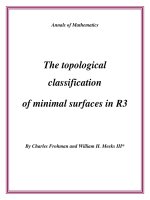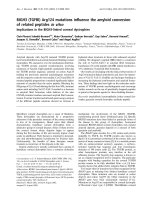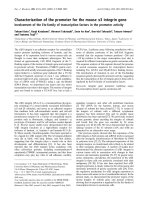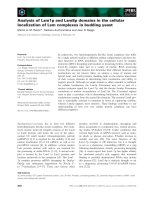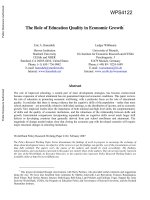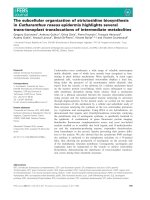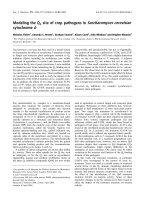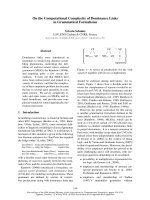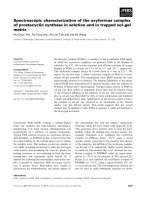Enhancing the communication skill of education managers in vinh phuc provinec basis for a training program
Bạn đang xem bản rút gọn của tài liệu. Xem và tải ngay bản đầy đủ của tài liệu tại đây (458.27 KB, 94 trang )
ENHANCING THE COMMUNICATION SKILLS OF EDUCATIONAL
MANAGERS IN VINH PHUC PROVINCE:
BASIS FOR A TRAINING PROGRAM
___________________________
A DISSERTATION
Presented to the Faculty of the Graduate School
Southern Luzon State University, Lucban, Quezon, Philippines
in Collaboration with
Thai Nguyen University, Socialist Republic of Vietnam
___________________________
In Partial Fulfillment
of the Requirements for the Degree
Doctor of Philosophy in Educational Management
___________________________
By
HOANG VAN BINH (PEACE)
October 2014
i
APPROVAL SHEET
The Dissertation of
HOANG VAN BINH
entitled
ENHANCING THE COMMUNICATION SKILLS OF EDUCATIONAL
MANAGERS IN VINH PHUC PROVINCE:
BASIS FOR A TRAINING PROGRAM
Submitted in Partial Fulfilment of the Requirements for the Degree
DOCTOR OF PHILOSOPHY IN EDUCATIONAL MANAGEMENT
A program offered by Southern Luzon State University,
Republic of the Philippines in collaboration with
Thai Nguyen University, Socialist Republic of Vietnam
has been approved by Oral Examination Committee
SUSANA A. SALVACION, PhD
Expert
APOLONIA A. ESPINOSA, PhD
Expert
Expert
BELLA R. MUELLO, EdD
External Panel
CECILIA N. GASCON, PhD
Chairman
Endorsed by:
Recommended by:
RICARYL CATHERINE P. CRUZ, EdD
Adviser
SUSANA A. SALVACION, Ph.D.
Dean, Graduate School
Accepted in Partial Fulfilment of the Requirements for the Degree
Doctor of Philosophy in Educational Management
WALBERTO A. MACARAAN, Ed.D.
Vice President for Academic Affairs
_____________________
Date
ii
CERTIFICATE OF ORIGINALITY
iii
ACKNOWLEDGMENT
The researcher wishes to extend his most sincere gratitude to the
following people who made this research study possible.
Dr. Cecilia N. Gascon, President of Southern Luzon StateUniversity,
Republic of the Philippines, who helped forge a linkage with Thai Nguyen
University through its president , Dr. Dang Kim Vui,which eventually led to the
offering of a doctorate program in Education Management, through the ITCTUAF;
Dr. Dang Kim Vui,the President of Thai Nguyen University, who made
the linkage with Southern Luzon StateUniversity, Republic of the Philippines
and the offering of a doctorate program in Education Management, through
the ITC-TUAF;
Dr.Ricaryl Catherine P. Cruz, for her support and supervision
throughout my graduate study program. Her kindness and daily instructions in
the last three years are greatly appreciated and this dissertation is as much
her work as mine;
Prof.NordelinaIlano, Director, Office for International Affairs of SLSU
for her support to the Ph.D.Ed.M students;
Dr. Tran Thanh Van, the Dean of the Graduate School of Thai Nguyen
University for his assistance and encouragement to pursue this study;
Dr. Nguyen ThanhHai, the Vice Director of International Training
Center, for his assistance and encouragement to pursue this study as
Ph.D.Ed.M Class Manager;
iv
To all the SLSU and TNU Professors, for their support and guidance
throughout my graduate studies in Thai Nguyen University, Vietnam;
To his ever dearest friends for their kindness and remarkable support;
To my family,my greatest source of inspiration, for their support and
encouragement which made his career a success.
HVB
v
DEDICATION
This piece of work is dedicated to my family.
HVB
vi
TABLE OF CONTENTS
PAGE
TITLE PAGE ………………………………………………………………..
i
APPROVAL SHEET ……………………………………………………….
ii
CERTIFICATE OF ORIGINALITY ………………………………………..
iii
ACKNOWLEDGMENT …………………………………………………..
iv
DEDICATION ………………………………………………………………
vi
TABLE OF CONTENTS …………………………………………………..
vii
LIST OF TABLES ………………………………………………………….
ix
LIST OF FIGURES…………………………………………………………
x
LIST OF APPENDICES …………………………………………………...
xi
ABSTRACT …………………………………………………………………
xii
CHAPTER
I
II
III
INTRODUCTION ……………………………………………
1
Background of the Study …………………………………..
2
Objectives of the Study …………………………………….
3
Hypothesis of the Study ……………………………………
5
Significance of the Study …………………………………..
5
Scope and Limitation of the Study ………………………..
6
Definition of Terms ………………………………………….
6
REVIEW OF LITERATURE ……………………….……….
8
Research Paradigm ……………………………...….………
24
METHODOLOGY
Locale of the Study ………………………….………………
26
Research Design …………………………….………………
26
Population of the Study …………………….…...…………..
27
Research Instrument ………………………...…….…….….
28
Data Gathering Procedure ………………………………….
28
Statistical Treatment …….…………………………………..
29
vii
IV
RESULTS AND DISCUSSIONS ……………………….….
31
Respondents’ Profile ………………………………………..
31
Respondents’ Perception on Communication Skills of
V
Educational Managers ………………………………………
33
Proposed Training Program ………………………………..
44
SUMMARY, FINDINGS, CONCLUSIONS AND
RECOMMENDATIONS
Summary…………………….……………………………….
63
Findings ………………………………………………………
63
Conclusions …………………………………………………
64
Recommendations …………………………………………
64
REFERENCES ……………………………………………………………..
66
APPENDICES ……………………………………………………………...
69
CURRICULUM VITAE …………………………………………………….
81
viii
LIST OF TABLES
TABLE
PAGE
1
Distribution of Respondents
27
2
Likert Method : 5-point Questionnaire
28
3
Frequency and Percentage Distribution of Respondents
Profile in Terms of Age
31
Frequency and Percentage Distribution of Respondents’
Profile in terms of Gender
31
Frequency and Percentage Distribution of Respondents
Profile in terms of Educational Qualification
32
Frequency and Percentage Distribution of Respondents
Profile in Terms of Length of Work Experience
32
Frequency and Percentage Distribution of Respondents
Profile in terms of Number of Years in Management
33
Mean Distribution of Respondents Perception in Terms of
Interpersonal Communication Skills
34
Mean Distribution of Respondents Perception in Terms of
Emotional Skills
35
Mean Distribution of Respondents Perception in Terms of
Sensitivity Skills
36
Mean Distribution of Respondents Perception in Terms of
Flexibility Skills
37
Mean Distribution of Respondents Perception in Terms of
Persuasive Communication Skills
38
Mean Distribution of Respondents Perception in Terms of
Problem Solving Skills in Communication Process
39
14
Summary of the Respondents’ Perception
40
15
Correlation of the Profile with the Communication Skills of
the Educational Leaders
41
Correlation of the Profile with the Communication Skills of
the Educational Leaders
42
4
5
6
7
8
9
10
11
12
13
16
ix
LIST OF FIGURE
FIGURE
1
PAGE
Input-Process-Output of the Communication Skills of
Educational Managers in VinhPhuc Province
x
24
LIST OF APPENDICES
APPENDIX
PAGE
A
Reliability Statistics
70
B
Pearson Correlation
76
C
Questionnaire
77
xi
ABSTRACT
Title of Research
: ENHANCING THE COMMUNICATION SKILLS OF
EDUCATIONAL MANAGERS IN VINH PHUC
PROVINCE:BASIS FOR A TRAINING PROGRAM
Researcher
: HOANG VAN BINH (PEACE)
Degree Conferred
: DOCTOR OF PHILOSOPHY IN EDUCATIONAL
MANAGEMENT
Name and Address
of Institution
: Southern Luzon State University Lucban, Quezon,
Philippines and Thai Nguyen University, Socialist
Republic of Vietnam
Adviser
: Dr. Ricaryl Catherine P. Cruz
Year Written
: 2013 - 2014
______________________________________________________________
The primary intent of this study was to investigate the communication
skills of the educational leaders on the proposed training program.Two
hundred forty-three (243) educational leaders participated as respondents in
this study. The communication skills covered the interpersonal communication
skills,
emotional
skills,
sensitivity
skills,
flexibility
skills,
persuasive
communication skills and the problem-solving skills in the communication
process. Measurement of the communication skills of educational leaders was
limited in the use of checklist questionnaire primarily developed for the study
from April 2013 to October 2013. As a result, mean distribution of perceived
communication skills indicators showed the following in terms of interpersonal
communication skills, emotional skills, sensitivity, flexibility, persuasive and
problem solving skills WM = 3.42, good respectively by district; high school
WM= 3.22, fair respectively; and primary/secondary WM = 3.30 fair
respectively.
In this context, the thesis proposes a system consisting of a set of
criteria to evaluate the communication skills of education managers in
xii
VinhPhucprovince. Based on these indicators, the thesis evaluates thecurrent
communication skills
of
education managers
in
VinhPhuc province.
Furthermore, it uses multivariate regression equation to determine the
influence of communication skills of educational managers. Based on the
findings, the following conclusions are drawn: (1) that the majority of
educational managers are matured females with higher educational
attainment and management experience; (2) that the communication skill of
the educational leaders at VinhPhuc province is just normally observed; and
that a training program is developed; (3) that the proposed training program
should be implemented to ensure a continuous succession of educational
leaders in the hierarchy of the Department of Education; (4) that there is more
room for improvement of the communication skills indicators like interpersonal
communication skills, emotional skills, sensitivity skills, flexibility skills,
persuasive communication skills and the problem solving skills of educational
leaders; and (5) there might be other sensitive variables or factors in
communication that could be used in future researches along with educational
management;
Wherefore,
considering
all
premises,
it
is
therefore
highly
recommended to the higher authority in the Education Department to
implement the proposed training program.
Keywords: Education, Ability, Leaders, Skills, Interpersonal, Emotional,
Sensitivity, Flexibility, Persuasive, Problem Solving.
xiii
1
Chapter I
INTRODUCTION
The strong relationship between effective communication and effective
management has been recognized since the 1950s (Reinsch& Shelby, 1997).
Over the past few decades, countless studies have found that the
communication skills, especially in the field of education, prove to be one of
the most desired and essential skills required of an effective manager (Weiss,
1999;
Greger&Withiam, 1991).
Recently,
however,
organizations
are
discovering that a completely different kind of leader – one with more than just
traditional, strong communication skills – is necessary for career success.
Indeed, education globalization, the expansion of type of education on a
worldwide scale, and the resulting diversity of today’s teachers and students,
necessitate development communication skills of educational managers.
The educational managers’ role has evolved over the past two decades
with the accountability demands that are forcing changes in education
practices. In the age of school reform, the educational managers of the
twenty-first century must provide the structure; resources and support that
schools need to succeed. Research indicated that successful educational
managers make important contributions to the improvement of student
learning
(Leithwood&Riehl,
2003).One
common
trait
identified
that
educational managers consistently demonstrate when exercising leadership is
highly developed communication skills (Gurr, Drysdale, &Mulford, 2006).
Some educational managers are finding it increasingly difficult to meet the
needs of all teachers and students, reduce the achievement gap, find viable
2
strategies for reaching adequate yearly progress, and have chosen to address
these critical concerns by implementing school reform models.
In management, the psychological contact between officials or
managers (to communicate) and the major management objects - individual
and collective (communication objects) is management communication which
is the basic content of the management. To establish relationships with
management objects, to deal with management tasks, to maintain
management functions, management staff should possess the psychological
traits and communication ability basic in any kind of management. In fact,
there have been no studies yet on communication ability among the education
leaders in VinhPhuc province. Hence, such study focusing on communication
skills of educational leaders is extremely of vital import.
Faced with the changing trends in management, officials need to be
trained regularly on business theory and management (including thematic
communication
management),
to
standardize
all
aspects
especially
communication skill in management. With the research "Enhancing the
Communication Skill of Education Managers in VinhPhuc Province: Basis for
a Training Program", the researcher would like to contribute a small part of the
theory and practice in building communication skills for educational leaders.
Background of the Study
Scientificrevolutionandmoderntechnologyhaveacceleratedthepaceofglo
balization, creatingbreakthroughs for humanity to walk into the new
millennium.
It
is
said
developmentofhuman society.
that
globalizationisaninevitable
trendinthe
3
With therapidchanges in a divergent society, communication behavior
in
general,
andculture
behaviorinparticular
are
important
issues
betweenthecommunityandschool management. Lack of language proficiency
and communication skills definitely can create barriers towards community
growth and development within the context of social mobility and political
governance.
VinhPhucis anewlyre-established province that had rapidly developed
as a dynamic business area especially during the period ofindustrializationand
integration stressing that theeducationalmanagersmust havevision, depth,
managership,
communication
skills
to
setthe
right
policies,
topromoteeducation andsocio-economic development that has gained more
focusin recent years; however, there are some inevitableweaknesses.
Therefore, improving thecommunication skills for educationalmanagers has,
indeed, become mandatory or imperative.Recognizing the problem, the
researcher decided to conduct a study on communication skills of educational
managers to point out the strengths and limitations. He also gives solutions to
improve the psychological quality, managership, and communication skills of
educational managers to spearhead rapid development in VinhPhuc Province
towards the path of industrialization and international integration.
Objectives of the Study
This study was conducted to assess the communication skills of the
educational managers in Vinh Phuc Province with an end in view of designing
a training program.
Specifically, it aims to:
4
1. Describe the profile of the respondents as to:
1.1. Age
1.2. Gender
1.3. Educational qualification
1.4. Length of work experience
1.5. Number of years in management
2. Determine respondents’ perception about communication skills of the
educational managers in VinhPhuc province in terms of:
2.1. Interpersonal communication skills
2.2. Emotional skills
2.3. Sensitivity skills
2.4. Flexibility skills
2.5. Persuasive communication skills
2.6. Problem solving skills in communication process
3. Ascertain the relation of the profile of the educational managers with
their communication skills in terms of:
3.1. Interpersonal communication skills
3.2. Emotional skills
3.3. Sensitivity skills
3.4. Flexibility skills
3.5. Persuasive communication skills
3.6. Problem solving skills in communication process
4. Develop a training program derived from the study.
Hypothesis of the Study
5
There is significant relationship between the profile of the educational
managers and the communication skills in term of:
• Interpersonal communication skills
• Emotional skills
• Sensitivity skills
• Flexibility skills
• Persuasive communication skills
• Problem solving skills in communication process
Significance of the Study
Educational managers can improve their communication skills.
Teachers will be aware of the different types of communication which
will eventually help them learn more teaching techniques in language skills
development.
Studentswho are the main concernand beneficiaryof educators will
benefit from the language program because it will create a positive effect on
the teaching and learning process.
The concepts and theories that can be drawn from this research study
maybe able to help future researchers.
This study could provide references for future proponents who wish to
venture into a similar study of this nature. Thus, basic tenets on
managementstyles and other dimensions on instructional variables could
serve as resources for other studies.
Scope and Limitation of the Study
6
The primary intent of this study was to further investigate the
communication skills of educational managersin relation to the proposed
training program. Two hundred forty-three (243) educational managers
participated as respondents in this study.
The
communication
skills
are:interpersonal
communication
skills,emotional skill,sensitivity skills,flexibility skills,persuasive communication
skills and problem-solving skills in communication process.
Measurement of the communication skills of educational managerswas
limited in the use of questionnaires particularly the checklist questionnaire
which was developed for the purpose of the study covering a one-year period
from April 2013 to April 2014.
Definition of Terms
For clarity and better understanding of the study, the following
terminologies are hereby defined conceptually and operationally. According to
Harper, Douglas (2013) and Donald Clark (2013), definition about
communication and its aspect can be summed up below:
Communication skillsincludeinterpersonal communication skills, emotional
skills, sensitivity skills, flexibility skills, persuasive communication skills,
and
problem
solving
skills
in
communication
processand
communication skill in English.
Emotional skills refer to a person's skills to deal with, manage, express and
control his or her emotional states, including anger, sadness,
excitement, anxiety and joy.
7
Flexibility skills refer to skills that can readily respond to altered
circumstances or conditions. In layman’s language, it may refer to a
person’s readiness and ability to change in order to adaptto
circumstances obtaining at the moment.
Interpersonal skillsinvolvean exchange of information between two or more
people. It is also an area of study. Related skills are learned and can
be
improved.
During
interpersonal
communication
there
is message sending and message receiving using both direct and
indirect methods. Successful interpersonal communication happens
when the message senders and the message receivers understand the
message.
Persuasive communication skill is the process of guiding people toward
theadoption of an idea, attitude, or action by rational and emotional
means.
Problem- solving skills consist of using generic or ad hoc methods, in an
orderly manner, forfinding solutions to problems.
Sensitivity
skills
create
give-and-take
relationships
which
enhance
understanding and mutual respect, acknowledge the needs and
feelings of others being aware of how one’s own behavior affects other
people, and focus on the positive aspects of conflict and values
differences.
Training programis designed for enhancing and reinforcing the specific skills
of educational managers.
8
ChapterII
REVIEW OF LITERATURE
This chapter deals with the review of related literature and studies,
conceptual/ theoretical framework and the research paradigm where the study
is builtaroundcommunication skills, interpersonal communication skills,
emotional skills, sensitivity skills, flexibility skills, persuasive communication
skills, and problem solving skills in communication process.
Communication
By studying the etymology of the word communication it appears that it
comes from the Latin verb "communicare" meaning to share, divide out,
impart, unite, join, in other words “to make common”. However, today, it is
used to refer to the process of exchanging information, sharing symbols and
meaning,
transmitting
ideas,
knowledge
etc.
The
emergence
of
communication as a field of research gained recognition during the second
half of the 19th century. The science of communication as we know it today
was primarily influenced by two main streams: the humanities and the social
sciences.
Concerning the influence of the humanities we should go back in time
and mention the ancient Greek arts and rhetoric and the contribution of other
disciplines such as aesthetics, hermeneutics and linguistics that were among
the traditions developed in the early 19th century. The second stream that
influenced the field of communication emerged a century later and included
experimental psychology and the social sciences. According to Abbott (2001)
the system of social science disciplines that crystallized in thatperiod included
9
anthropology,
economics,
political
science
and
sociology
but
not
communication. Communication as a science emerged as a result of research
and findings in various fields. At first sight, all this variety might create the idea
that communication is a ragbag of concepts and theories that differ from one
another. Concerning this point, Craig (1989) agrees that the terrain is
confusing if we insist on looking for some kind of grand theoretical overview
that brings all communication study into focus, but he also suggests that
communication theory is a coherent field when we understand communication
as a practical discipline. He identifies seven main traditions where
communication theory is based, which are as follows: rhetorics, semiotics,
phenomenology, cybernetics, social psychology, socio-cultural theory and
critical theory (Craig, 2011).
Having good communication skills or communicating effectively with
other people was specifically identified as an employer expectation of new
hires. It became an increasingly important part of getting and retaining a job.
Maureen Carrig(1999) shared an Office Team study in the Treasury
Management Association Journal. According to a research project conducted
by the international staffing firm Office Team, by the year 2005, technology's
transformation of the workplace will not only place a premium on technical
competencies, it will also put employees' people skills to their greatest test. In
fact, your interpersonal and communication skills could make or break your
career success (p. 53).
Carrig (1999) went on to suggest specific communication skills that
would be of increased importance. Technologyput a new emphasis on writing
skills. Electronic mail required employees to draft documents sentto multiple
10
customers simultaneously. Negotiation and persuasion skills would be
required of those utilizing audio and video teleconferencing technology.
The Journal of Marketing Education published an article by Callum J.
Floyd and Mary Ellen Gordon (1998). This piece compared the employer’s,
student’s, and staff’s perceptions of the most important skills required to be
successful in a career. This publication catered to marketing professions, but
stated that "communication skills have been found to be important in most
studies" (p. 103) of employer skill preferences. Special emphasis was placed
on the necessity of understanding customer requirements. The customers, in
this case, were the student, the educational funding source, and employers.
Geoff Maslen (2000) of The Times Higher Education Supplement
relayed the attitudes shared by a group of Australian employers. When
surveyed regarding the preparation of students graduating from Australia's
universities and technical colleges, the most frequently cited deficiencies were
in the areas of communication and interpersonal skills.
Theoretical Contributions on Communication Theory
Given this variety of traditions and research areas, scholars’
perceptions and definitions of communication have been numerous, and as
we shall see further, have seen numerous changes over time. Some
researchers present an abstract perspective on communication, others define
it more specifically, and othertheorists provide a rather narrow definition, and
so on. So it is clear that we cannot find a uniform definition that will bring
together researchers and produce a single view on communication as a
science. Consequently, we will consider various definitions and viewpoints
expressed by well-known personalities in the field of communication.
11
According to Shannon and Weaver (1949, 95) "Communication is all of
the procedures by which one mind can affect another." It is clear that this
definition is too broad and general. Miller. K (2002, 5) argues that Weaver's
definition includes virtually everything, and therefore does not help us to
distinguish communication from other forms of human activity. In order to
illustrate this point she brings the following example: "If one person decided to
plant a flower and another person noticed it, this would count as
communication." (ibid).
Another researcher, Hoben (1954) believes that "communication is the
verbal exchange of a thought or idea." What is interesting in this definition has
to do with the fact that here the success of the exchange of ideas or thought is
considered achieved. Meanwhile, Berelsonet.al. (1964, 254) does not focus
on the success of communication. He provides the following definition:
"Communication [is] the transmission of information, ideas, emotion, skills
etc., by the use of symbols - words, pictures, figures, graphs etc. It is the act
or process of transmission that is usually called communication." In this case,
we understand that the information is transmitted, but not necessarily received
or understood by the other person.
According to Littlejohn and Foss (2005), a variety of terms are used to
define communication, such as symbols, parole, understanding, process,
transmission, channel, meaning and situation. But more specifically this is
found in Crystal (2003:85) who supports the idea that "communication refers
to the transmission of information (a ‘message’) between a source and
receiver using a signaling system: in linguistic contexts, source and receiver
are interpreted in human terms, the system involved is a language, and the
12
notion of response to (or acknowledgement of) the message becomes of
crucial importance. In theory, communication is said to have taken place if the
information received is the same as that sent."
Another leading figure in the field of communication, Pearce. W (1989)
comes up with the idea that we live in communication and not outside
communication and use it for our purposes. However, King. S (1989, 1)
presents a more social dimension of communication. She emphasizes that
effective communication between people is central to personal, social and
natural harmony. Understanding of oneself, family, friends and the
surrounding environment requires communication. However, further on, we
will examine the theoretical contributions of some influential researchers in
this field since our main goal is to present the main viewpoints on
communication theory.
Earlier studies on the theory of communication were concentrated on
the language and the ways in which the latter expresses meaning. Among the
first who contributed in this area was the French linguist Ferdinand de
Saussure, with the semiotic theory in early 1900. Among others, he suggested
that the language is a system of signs where the words are used to mark
objects. In the same line are Baylon et al (2003, 22) according to whom: "The
prototype of linguistic sign is the word, but we rarely talk with separate words.
The words themselves are made to be used in compound sentences, which
are macro signs," It is important to emphasize here that Saussure was the first
who made the distinction between language and speech. According to
Saussure (1916) through the spoken or written word it is possible to use
linguistic systems in real life situations.
